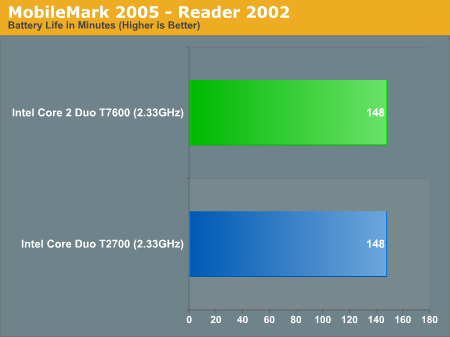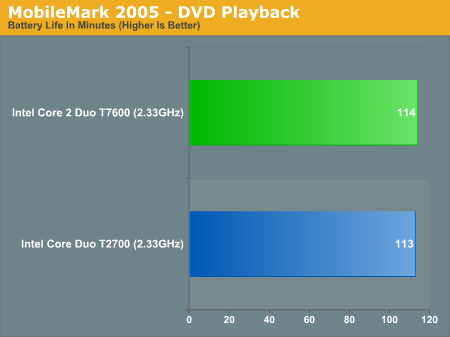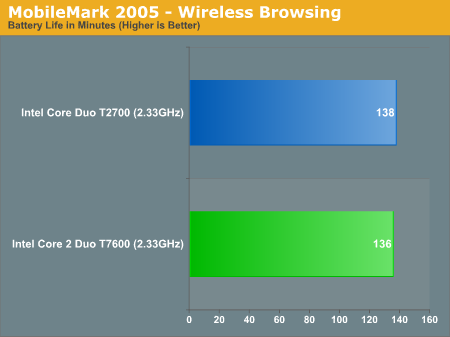Mobile CPU Wars: Core 2 Duo vs. Core Duo
by Anand Lal Shimpi on August 3, 2006 9:25 AM EST- Posted in
- CPUs
Battery Life - Reading
MobileMark's next battery life test is the Reader 2002SE benchmark, which only provides a battery life metric: The workload in this category models a notebook user reading a book on his computer.

Here there's no difference between Core Duo and Core 2 Duo, which in the mobile world is important. If Intel isn't going to give us any more battery life, it had better not take any away.
Battery Life - DVD Playback
The DVD Playback 2005 test is just as it seems, this benchmark measures battery life while playing DVD content. The content is provided by BMW:

The DVD playback test agrees with the previous three tests, there's no change to battery life with Core 2 Duo.
Battery Life - Wireless Web Browsing
Our final battery life test centers around wireless internet browsing.
This test requires a web server to wirelessly feed content to the machine being tested, as it browses the web pages stored on the server until it runs out of battery.

In our final battery life test, the Core 2 Duo T7600 actually falls behind its Core Duo counterpart by 2 minutes, but the margin of error for battery life tests is usually at least 1%, so overall battery life is essentially identical.










46 Comments
View All Comments
Spacecomber - Thursday, August 3, 2006 - link
I know that we are perhaps past the time for this, but I'd be curious how the Pentium M stacked up against its replacement, the Core Solo. It might shed some light on the roots for the Core line of processors.ksherman - Thursday, August 3, 2006 - link
I for one hope Apple pops these babies in the MacBook as well as the MacBook Pro. I have been reading a lot of rumors suggesting that Apple will only put Merom in the Pro model at first... Seems kinda goofy, since they purchase processors in *relatively* low quantity. Ive got my eye on the MacBook, so any performance increase with no price premium is always a plus, and I do plan on doing a lot of video editing/renderingmlittl3 - Thursday, August 3, 2006 - link
I'm waiting for the third revision of the Macbook Pro in the middle of next year. By this revision most of the problems with the new designs should be ironed out and these notebooks will probably be based on the Santa Rosa platform (800 MHz FSB). Right now I have a 1.5 GHz G4 Powerbook and it does what I need. I will upgrade to the Macbook Pro 2.4 GHz Core 2 Duo (Merom) on the Santa Rosa platform. If you like your notebook right now, I would wait until then. This would give you the most stability and bump in performance in the near future. Expect the third revision sometime next summer.mlittl3 - Thursday, August 3, 2006 - link
To be more clear:First Revision - Macbook Pro 2.16 GHz Core Duo 667 MHz FSB 2 MB (1Q 2006)
Second Revision - Macbook Pro 2.33 GHz Core 2 Duo 667 MHz FSB 4 MB (3Q 2006?)
Third Revision - Macbook Pro 2.4 GHz Core 2 Duo 800 MHz FST 4 MB (2Q 2007?)
AndrewChang - Sunday, August 6, 2006 - link
Santa Rosa... At the earliest? I mean, I supose with the Core 2 Duo being 'crippled' by a slow(er) FSB, it might be worth the wait. But what do you think Anand means by, at the earliest?Whats next after Santa Rosa? Does he know something we don't know? Well, thats a given, but now I'm sketched out about all this... Should we expect some early adopter problems with the introduction of this newfangled Robson technology? God, for a hardware enthusiast, who would've thought that making a new hardware purchase could be so tough. All I want is the fastest performing Merom/Leopard based Macbook Pro available. Am I really going to have to wait until at least Santa Rosa next year? It's going to be a long wait...
Olaf van der Spek - Thursday, August 3, 2006 - link
What three Compaqs?
Anand Lal Shimpi - Thursday, August 3, 2006 - link
Didn't you see the three compaqs in the review? ;)Take care,
Anand
yacoub - Thursday, August 3, 2006 - link
now this is a test i can totally appreciate: everything is identical except the CPU, so you get to see what the REAL WORLD benefit of changing the CPU is in your REAL WORLD system that people might actually buy/own. ie, instead of maxing everything else out with parts 99% of people don't buy / can't afford.of course the result is that you see that the real world difference is only noticeable in some situations and with some programs. but hey, that's the reality of it and actually it's easy to see that since the pricing is comparable and all else the same, it's a decent upgrade and certainly a level of future-proofing as well.
jones377 - Thursday, August 3, 2006 - link
It was interesting to compare the numbers in this review with the previous Core 2 Duo desktop review where 2MB vs 4MB L2 cache was examined (although at 1,83GHz/1066)http://www.anandtech.com/cpuchipsets/showdoc.aspx?...">http://www.anandtech.com/cpuchipsets/showdoc.aspx?...
Its not a perfect comparison but from what I can gather, there are significant improvements performance wise coming from the core, even in the non-FP/SSE related benchmarks. A favorite argument among some people is that the extra cache makes all the difference, I hope this will shut them up! (tho I really doubt it)
iollmann - Tuesday, September 26, 2006 - link
In SSE code, I see close to a factor of 2 performance increase from Yonah to Merom much of the time. These benchmarks are depressing. The improvement should be better than what we see. Does no one vectorize?